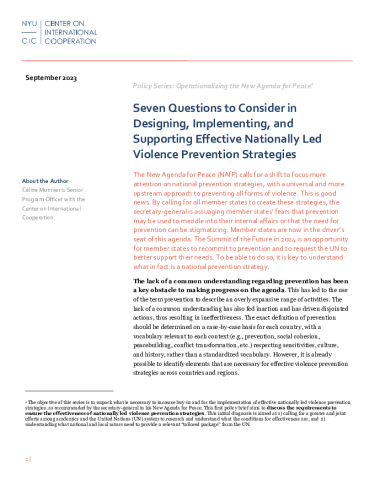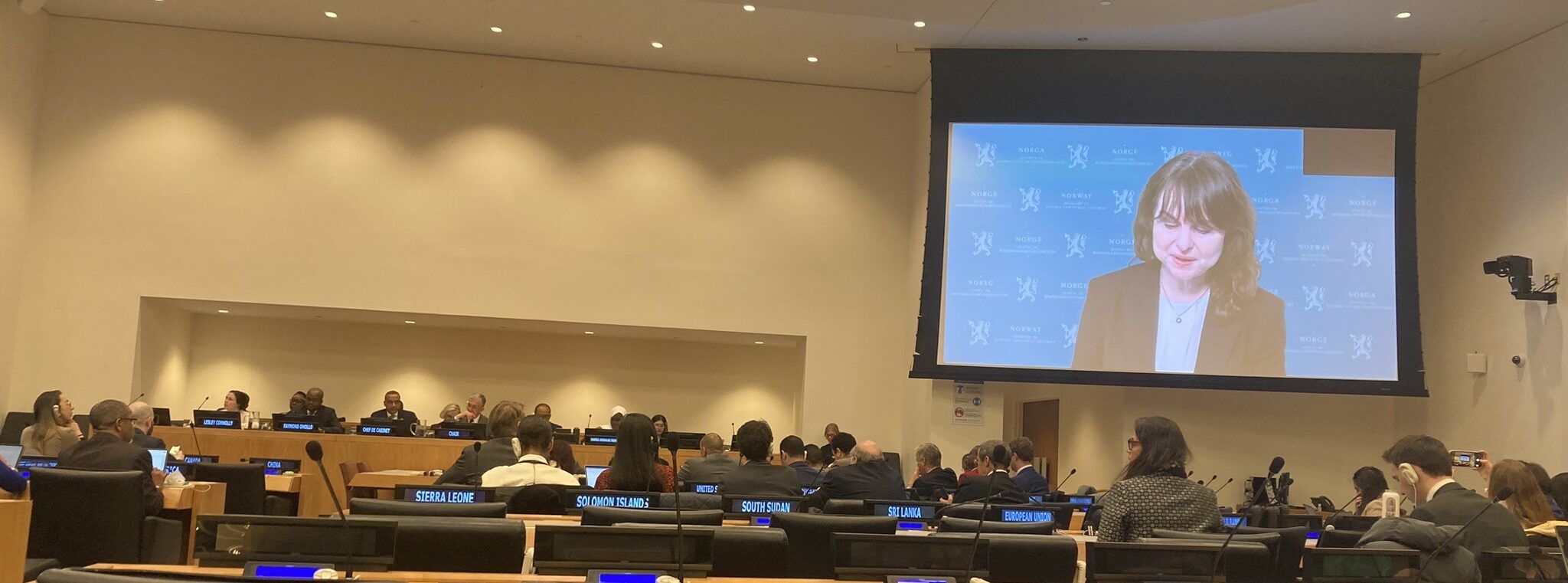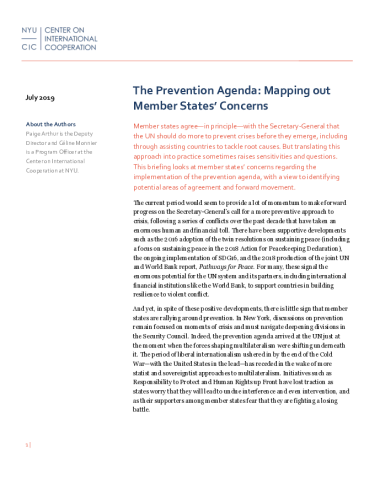A demand-driven approach to prevention
The aforementioned Security Council and PBC meetings demonstrated member states’ appetite to discuss national prevention efforts. In fact, there were multiple requests by member states to organize further exchanges. The Philippines, for example, expressed interest in sharing lessons from the Bangsamoro peace process and current efforts towards sustainable peace at the PBC. Organizing further exchanges could help normalize and destigmatize prevention, thereby increasing interest in developing national prevention strategies.
Importantly, these meetings showed that national prevention strategies and efforts to address multiple forms of violence (e.g., violent extremism, crime, or conflict) already exist in countries from all regions, which underscores the universality of prevention. Besides Kenya, Norway, and Timor-Leste—who all presented their national strategies and approaches during the PBC meeting—other member states referred to their own efforts from the floor. Sierra Leone highlighted the establishment of its Independent Commission for Peace and National Cohesion, Denmark presented its violent extremism prevention approach, and Nepal shared lessons from its peace process. Other examples include Liberia and Costa Rica’s infrastructures for peace, Germany and Indonesia’s prevention of violent extremism strategies (PVE), and Czechia and South Africa’s crime prevention strategies. Using the PBC to present national examples can help showcase what national prevention strategies may look like in practice and enhance learning opportunities.
Benefits of discussing prevention at the PBC: Member states’ perspectives
An effective national prevention strategy is context-specific and anchored in national ownership. The PBC is well-placed to showcase and support that national ownership. Kenya, for instance, presented its comprehensive and inclusive national peacebuilding architecture review. In turn, the visibility and positive attention that the PBC can provide to member states can encourage further investment in and commitment to national prevention efforts. During the meetings, some member states asked donors and the UN to support the host country’s priorities by using context-based indicators instead of following their own priorities and imposing “universal” indicators.
While stressing the importance of context specificity, member states also show an interest in adopting an evidence-based approach to violence prevention. The PBC can provide a space to share good practices that may be relevant across contexts. For instance, Kenya, Norway, and Timor-Leste underlined their efforts to adopt whole-of-government and whole-of-society approaches. Beyond the few examples presented at the PBC, many national strategies highlight national efforts to adopt evidence-based approaches. For example, Canada, Mexico, Bolivia, Pakistan, Switzerland, the United Kingdom, among others, stress the importance of prevention strategies to be informed by analyses of risk factors (or root causes) for violence. Lebanon’s PVE strategy is designed as a “living document” to be reviewed annually and adapted based on evaluations and contextual changes. Discussing national prevention strategies at the PBC is thus an opportunity for member states to strengthen their strategies in a way that is both nationally owned and evidence-based.
During the March meetings, member states stressed the PBC’s added value to support prevention efforts, particularly in terms of good practices and lessons learned exchanges, including among g7+ countries. In addition, member states highlighted that the PBC can play a critical role by mobilizing partnerships and resources, and ensuring coherent support to national prevention strategies. Particularly, member states requested inviting stakeholders that could provide financial support (international financial institutions, bilateral donors, the private sector, etc.). Such partnerships and exchanges of lessons learned would be particularly valuable in the context of the transitions of UN peace operations. Further understanding how the PBC and the UN system can help member states to develop and implement national prevention strategies based on their needs is key, and is especially relevant given the upcoming Peacebuilding Architecture Review.
Next steps: building on the momentum
Global trends on multiple forms of violence are concerning: conflict-related deaths have increased in the last few years and the number of homicide-related deaths in 2022 was double than conflict-related deaths. Effective violence prevention efforts require evidence-based, comprehensive, and sustainable national efforts. In other words, they require national prevention strategies.
As highlighted throughout this blog post, there is momentum amongst member states to provide more attention and support to national prevention strategies, and the PBC is one important venue.
Member states can build on such momentum through the following:
- Use the Summit of the Future and the Peacebuilding Architecture Review to emphasize the universality of prevention, encourage member states to develop evidence-based national prevention strategies, and ensure that the UN is well positioned to support them.
- Continue to voluntarily showcase their national prevention strategies around various forms of violence at the PBC to normalize and destigmatize prevention, help member states understand what strategies could look like in practice, and request UN support through regular exchanges.
- Clarify the benefits of presenting their national prevention strategies at the PBC, as well as the support they would like to receive from the PBC and the UN system to develop and implement such strategies.
Learn about New York University (NYU)’s work on prevention:
Photo: March 22, 2024 Peacebuilding Commission Ambassadorial-level meeting on National Efforts for Prevention and Peacebuilding, United Nations Headquarters, New York, US. © NYU Center on International Cooperation.





